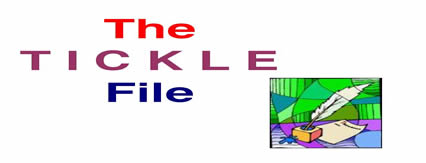
|
The Tickle File is ftm's daily column of media news, complimenting the feature articles on major media issues. Tickle File items point out media happenings, from the oh-so serious to the not-so serious, that should not escape notice...in a shorter, more informal format.
We are able to offer this new service thanks to the great response to our Media Sleuth project in which you, our readers, are contributing media information happening in your countries that have escaped the notice of the international media, or you are providing us information on covered events that others simply didn't know about. We invite more of you to become Media Sleuths. For more information click here. |
Hot topics click link for more
Hungary’s Finance Minister Mihály Varga announced last week an economic stimulus package to be presented to parliament, reported index.hu (May 30). One item is the effective repeal of the controversial advertising tax. The tax rate will be reduced to zero with enforcement of the law suspended until 2022.
The ad revenue tax came into effect in 2014, first with a progressive rate. The European Commission came down like a hammer citing State Aid rules forcing the Hungarian government to suspend the tax before lowering the rates with an erratic exemption policy, none of which was explained to the European Commission. Exempt from the tax were media companies with net annual ad sales revenues under HUF 100 million, about €300,000. Hungarian media watchers concluded that the tax was meant to punish television broadcaster RTL Klub, owned by RTL Group, which offered news coverage critical of the government. (See more about media in Hungary here)
The ad revenue tax came into effect well before significant ownership consolidation of pro-government media, now looking at a major tax bill. Without political relief, said Hungarian Publishers Association (Magyar Lapkiadók Egyesülete) president Tibor Kovács, quoted by state news agency MTI (May 31), “the industry would not be able to keep up.” Mr. Kovacs has been appointed chief executive of Ringier Axel Springer’s Hungarian subsidiary, which publishes the Blikk tabloid, reported news portal 444.hu (May 23). He resigned as managing director of Lapcom Zrt., the publisher operated through government media umbrella Central European Press and Media Foundation (KESMA), which controls government ad spending.
“RTL is not for sale,” said RTL Hungary chief executive Gabriella Vidus to a press conference this week, quoted by index.hu (June 3). On reports this past weekend in government-friendly media that that company has had a “huge drop” in revenue, she said legal remedies are being considered to correct the inaccuracy.
It was a story that occupied considerable media attention just eight months ago. Interest was piqued at different levels; gristly murder, international intrigue and, even, press freedom. But, in this digital age, short attention spans and shorter memories prevail. Some within the journalistic tribe provide blunt reminders.
This past weekend publishing trade body WAN-IFRA at its annual conference in Glasgow, Scotland bestowed its highest award for the defense of journalism to the late journalist and columnist Jamal Khashoggi. Only twice before had the Golden Pen of Freedom award been given posthumously. Jamal Khashoggi was murdered October 2nd, 2018 inside the Istanbul, Turkey Consulate of Saudi Arabia. In the following several months details, often gruesome, emerged implicating official Saudi knowledge if not participation. (See more about press/media freedom here)
“Since last October, many of us who knew Jamal have been in a daze. Not able to comprehend what was done to him, why the Saudi government deemed his words so dangerous he had to be brutally murdered. His body disappeared. Just to silence him,” said Saudi journalist Safa Al Ahmad, who accepted the award, in a statement (June 1). “Jamal’s death goes unpunished. The devastating war on Yemen continues. And we are left alone. Speaking our truth to power. Wondering which one of us will be the next to be disappeared. Tortured. Killed.”
Since March this year the One Free Press Coalition has published monthly its top 10 most urgent press freedom cases. Jamal Khashoggi’s murder has been on that list each month, number 2 for June. The One Free Press Coalition was formed by a global who’s who of news publishers, now numbering more than 30. The case of Tanzanian journalist Azory Gwanda, missing since November 2017, tops the June list.
|


